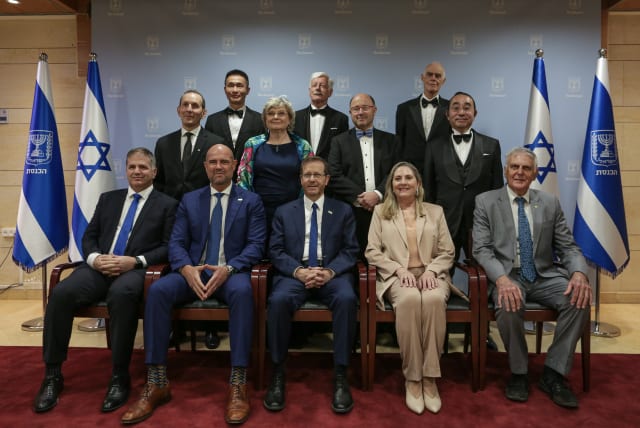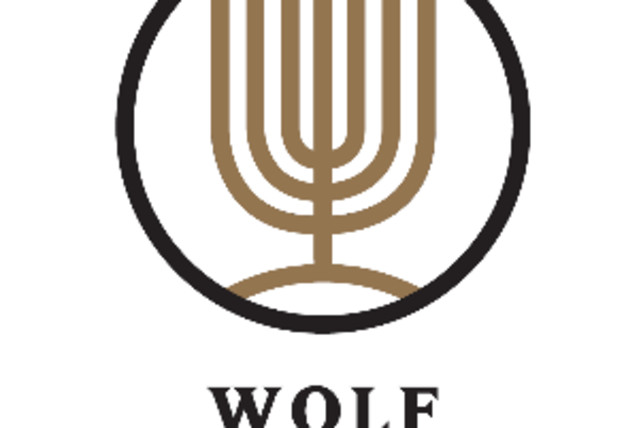Who are the 2023 'Israeli Nobel' Wolf Prize winners?

The eight outstanding scientists and artists from abroad received their awards in the fields of chemistry, medicine, mathematics, agriculture and art.
The names of winners of this year’s Wolf Prize, regarded as “Israel’s Nobel Prize” and a predictor of who will receive Nobel Prizes in the future, were announced this week in a series of events and meetings.
The eight outstanding scientists and artists from abroad received their awards in the fields of chemistry, medicine, mathematics, agriculture and art from President Isaac Herzog in the Knesset on Thursday night.
“The value of scientific discovery – the kind that serves humanity and the relations among peoples – was a central theme in the life of Dr. Ricardo Wolf, who endowed the prize and whom I had the pleasure of knowing as a child," said Herzog. "It is a great honor for the State of Israel to be entrusted with awarding the prize in his name to outstanding scholars and artists like yourselves. Each of you is carrying on his legacy and making a lasting imprint on our civilization. I would like to thank the Wolf Foundation, and all of its trustees, council and committee members, for inspiring us to appreciate the true potential of humankind,”
He added that he wished all of them many more years of creativity and contribution to our nations, our planet and all of humanity.
"May your quest for discovery always stay connected to wise and intelligent hearts that know that there is no greater good than a kinder, softer and more compassionate world,” he said.

The Wolf Foundation was founded in 1975 by inventor, diplomat, and philanthropist, the late Dr. Ricardo Wolf and his wife who donated their own capital to establish the foundation which they co-founded with the late fourth president of Israel Ephraim Katzir and former prime minister Yitzhak Rabin.
The festive ceremony concluded a series of events and meetings in which the Laureates participated during the week. Thousands of researchers, academics, artists, senior officials in the economy, students and youth got to meet the laureates and be inspired by them. Conferences, symposia and meetings were held all across the country, including at the Technion, Tel Aviv University, the Faculty of Agriculture of the Hebrew University, the Volcani Institute, the Weizmann Institute, Ben-Gurion University, the Israel Museum and Sheba Medical Center and the Hadassah-University Medical Center.
The Wolf Prize, which enjoys a prestigious international reputation, is now in its 48th year and has so far been awarded to 373 scientists and artists. About a third of the Wolf Prize winners subsequently won a Nobel Prize in fields the two prizes have in common.
Wolf Prize Laureates over the years include Prof. Stephen Hawking and Weizmann Institute Prof. Ruth Arnon; artists Marc Chagall, Anselm Kiefer, Louise Bourgeois; musicians Laurie Anderson, Isaac Stern, conductor Zubin Mehta and opera singer Jessye Norman.
What did the winners get the prize for?
Among 2023’s laureates are the endocrinologist who laid the foundation for the production of innovative hormone-based drugs to treat diabetes and obesity; the mathematician who revolutionized the world of mathematics and paved the way for technological innovations in the worlds of digital cinema and medical imaging; the researchers who developed strategies for using biopolymers to eradicate diseases; the researcher whose models he built for water flow and predicting contaminant transport in soils helps agriculture around the world; and the artist who ignores fixed paradigms creates a new life for earth, snow, and fog and brings together in their creation the worlds of nature, poetry, technology and science.
The Wolf Prize in Medicine for 2023 was awarded to Prof. Daniel Drucker, University of Toronto, Canada for pioneering work in elucidating the mechanisms and therapeutic potential of enteroendocrine hormones. He made seminal contributions to the understanding of the physiology and pharmacology of glucagon-like peptides (GLPs) and their use for the benefit of patients. His discoveries of GLP-1, GLP-2, and dipeptidyl peptidase-4 (DPP-4) activity have enabled the development of multiple new innovative classes of medications for the treatment of diabetes, obesity, and obesity-associated comorbidities.
The Wolf Prize in Mathematics was awarded to Prof. Ingrid Daubechies of Duke University in North Carolina for work in wavelet theory, applied harmonic analysis and modern time-frequency analysis. Her work is of tremendous importance in image compression, medical imaging, remote sensing, and digital photography. Daubechies has also made unparalleled contributions to developing real-world applications of harmonic analysis, introducing sophisticated image-processing techniques to fields ranging from art to evolutionary biology and beyond. Her Wavelet theory has become a crucial tool in many areas of signal and image processing. For example, it has been used to detect forged documents and fingerprints.
The Wolf Prize in Chemistry was shared by Profs. Chuan He, Jeffery Kelly and Hiroaki Suga for pioneering discoveries that illuminate the functions and pathological dysfunctions of RNA and proteins and for creating strategies to harness the capabilities of these biopolymers in new ways to ameliorate human diseases.
He of the University of Chicago discovered reversible RNA methylation and its role in the regulation of gene expression. He has done pioneering work elucidating the chemistry and functional consequences of RNA modification.
Suga of the University of Tokyo received his award is awarded to Hiroaki Suga for developing RNA-based catalysts that revolutionized the discovery of bioactive peptides. Suga used tools of bioorganic chemistry, chemical biology, and biotechnology related to RNA, translation, and peptides and developed a platform for producing and selecting billions of macrocyclic peptides as high-affinity binders to disrupt protein-protein interactions.
Kelly of Scripps Research Institute in San Diego, California, developed a clinical strategy to ameliorate pathological protein aggregation.
Most protein molecules must fold into defined three-dimensional structures to function properly. Misfolded proteins can form toxic aggregates, such as fibrillar amyloid deposits, which may lead to neurodegeneration in Alzheimer’s disease and many other pathologies.
The Wolf Prize in Agriculture was awarded to Prof. Martinus Th. “Rien” van Genuchten at the Federal University of Rio de Janeiro, Brazil for his groundbreaking work in understanding water flow and predicting contaminant transport in soils. He created a much-needed scientific basis for understanding fluid flow and contaminant transport processes in unsaturated soils, including their interactions with the atmosphere above and groundwater below.
The Wolf Prize in Art was jointly awarded to Fujiko Nakaya and Richard Long for redefining the possibilities of art-making and transforming the parameters of visual art. Nakaya, one of Japan’s leading artists, is a longtime pioneer of work that intermingles the realms of art, nature, science, and technology. Her sculptures, films and videos, installations, and paintings produced over a seven-decade career engage fundamental subjects such as the environment, perception, and communication. Half a century after she first developed the concept of fog sculptures, she continues to astonish audiences with the magic of work made at the junction of art and nature, poetry and science.
Long is a pioneer of conceptual art centered on personal interaction with the natural world. Over the course of nearly six decades, his solitary walks throughout the world have generated a complex body of work comprising sculptures, photographs, and drawings that are nature-based: rocks and stones, logs and twigs, mud and soil. Education Minister and chairman of the Wolf Foundation Council, Yoav Kisch said that “thanks to your curiosity, science is progressing, art is evolving and humanity is moving forward. Your great achievements, for humanity and for friendship between the nations make the world a better place.”
Knesset Speaker Amir Ohana: "Sometimes, it takes many years for a brilliant theory or A work of art, to transition from being rejected and ridiculed, to finally receiving the recognition it deserves. You, esteemed laureates, stand among those who have the privilege to witness the profound recognition of your contributions to humanity – in your own lifetimes.”
